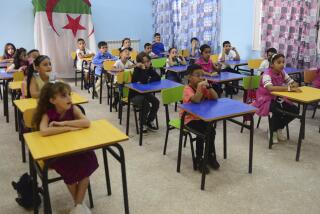Acquiring Language: Two Views
- Share via
In 1977 my son Will, then 4, began attending an ecole maternelle, roughly the French equivalent of a kindergarten, in Paris. When I enrolled him, I asked the director if any of the teachers spoke English. Oh, she said, everyone speaks French here. There are too many children from too many countries for it to be any other way.
That fall was the hardest of Will’s entire childhood. After three weeks of putting up a good front, he began waking up in the middle of the night and screaming that he didn’t want to go to school the next day. But staying home was not an option for either parent, so Will had to go to his ecole maternelle every morning, like it or not.
By the end of three months, he liked it. And not coincidentally, he was speaking French. It wasn’t as grammatical as mine, but his accent was better. And before long, I was asking him the meaning of street idioms that he picked up from his friends Matthieu and Olivier.
The rest of the year was a breeze. When my classes were over, I would take Will and his buddies for ice cream and pony rides. And thanks to his pint-size contacts, we ended up socializing with adults we wouldn’t have known otherwise.
If we had stayed in France, Will’s French would have gotten better and better. But if he had been home-schooled or placed in a private English-only school, the results can well be imagined: social and intellectual narrowness and, later, second-class citizenship along the margins of society.


